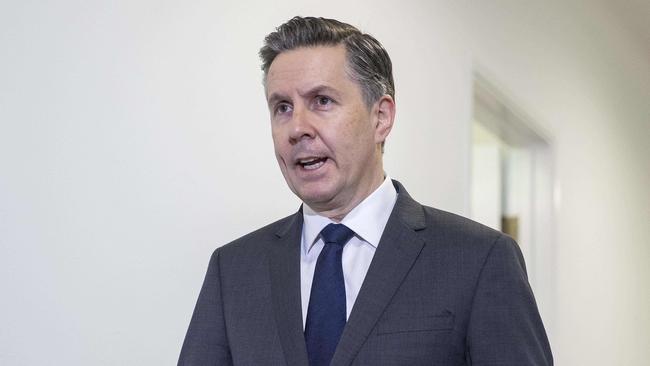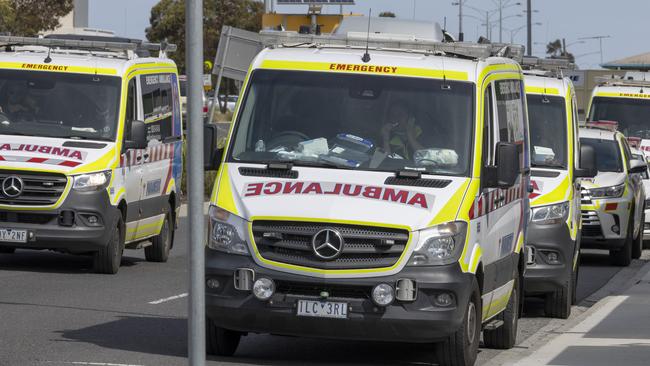Women who want to work should get more support says Labor
Supporting families to better share unpaid and paid care work will allow more women to enter workforce and unlock huge economic opportunities, the federal government says.
National
Don't miss out on the headlines from National. Followed categories will be added to My News.
Supporting families to better share unpaid and paid care work will allow more women to enter workforce and unlock huge economic opportunities, Australia will tell G20 nations.
Finance and Womens Minister Katy Gallagher is in Bali for a meeting with her counterparts and will use a speech on Wednesday to signal the federal government’s commitment to improving the “care economy”.
Ms Gallagher will argue as long as care predominantly remains the domain of women, the world can’t fully address the challenges in the care economy or achieve gender equality.
“Our economic, industrial and employment settings need to support the sharing of paid and unpaid care work between men and women,” she will say.
“In our homes and communities we need to challenge the norms that care work is women’s business and instead value that work as a critical contribution to our economy and to our thriving communities.”

Ms Gallagher will say it was already well known women had borne the brunt of the economic consequences of the pandemic, “largely through their roles as paid and unpaid carers”.
“It is clear that access to quality care in a formal care economy is critical to broader workforce participation, especially for women,” she will say.

“Equally, we have a deep ambition to provide high quality and dignified care for older people and people with disability, as well as early childhood education for children.
“But we need carers and educators in place in to make this happen.”
Across the two day meeting, Ms Gallagher will have one-on-one meetings with her counterparts from Indonesia, Fiji, the UK, India and the European Union. Ms Gallagher said the G20 Women’s Summit was “key” to understanding how governments could invest in and reform the care economy.
She said it was important to “unleash the potential of our whole community to participate in the economy in the ways that work for them and support all people to be cared for with dignity and respect”.
LABOR: MIGRATION NO QUICK FIX FOR HEALTH WORKER CRISIS
Relying only on skilled migrants to fill Australia’s critical health worker shortage will not be enough to sustain the sector increasingly strained by an ageing population, the federal government will argue.
With nurses, physios, doctors, paramedics and support staff like cleaners and security guards in increasingly short supply, Health Minister Mark Butler has gathered experts, frontline workers, unions and medical bodies in a bid to develop long term solutions to the nation’s health workforce crisis.
The group will meet in Canberra on Tuesday, with Mr Butler urging those who “walk the wards every day” and “know the system” to work with governments to help fix the health system.
“The fact is that if you don’t support skilled workers to deliver healthcare to the community, the health system fails,” he will say in a speech at the roundtable.
“Our priority should be investing in the skills of the staff that are there, and the skills of the next generation of health workers.”

Mr Butler will say using migrant workforce was only “one strategy” to solve the crisis.
“There are opportunities for growth in the health workforce and in training to ensure we have the training pipeline and career pathways right,” he will say.

“But we need to have an honest conversation about what else we need to do, to ensure we have the health workers we need in regional, rural and remote areas – tackling the difficulties are complex.”
Ensuring health staff have a safe workplace will also be a key focus for the federal government in order to attract and retain people in the sector.
“Governments at all levels have a responsibility to ensure health workers can go to work and do their job safely, and they are given the resources to do it,” Mr Butler will say.
“There are no easy answers, but we need to take on these difficult issues if we’re to have the workforce we need for our growing and ageing population.”
Australian Nursing and Midwifery Federation secretary Annie Butler said she was looking forward to taking part in the roundtable.

“This is just the start of the rebuilding exercise we urgently need to restore our health system and support our exhausted frontline nurses, midwives and healthcare workers,” she said.
“The roundtable will commence a process which gives us all the opportunity to work together to develop solutions.”
Through public and private organisations there are more than 1.4 million people employed in the delivery of health and welfare services in Australia.
The health sector is already Australia’s largest source of employment and has the strongest growth projections of any industry – up 16.1 per cent from 2017 to 2022.
More Coverage
Originally published as Women who want to work should get more support says Labor





